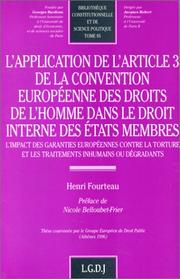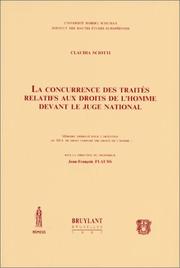| Listing 1 - 10 of 14 | << page >> |
Sort by
|

ISBN: 2275015183 9782275015187 Year: 1996 Volume: 85 Publisher: Paris: Librairie générale de droit et de jurisprudence,
Abstract | Keywords | Export | Availability | Bookmark
 Loading...
Loading...Choose an application
- Reference Manager
- EndNote
- RefWorks (Direct export to RefWorks)
La prohibition de la torture et des traitements inhumains ou dégradants consacrée au plan européen par l'article 3 de la Convention Européenne des Droits de l'Homme semble être inutile ou peu appropriée aux démocraties européennes, berceaux des droits de l'homme et respectueuses des libertés individuelles. Toutefois, la jurisprudence de la Commission et de la Cour européennes sur la question et la mise en oeuvre récente de la Convention européenne pour la prévention de la torture de 1987 indiquent qu'il subsiste des problèmes dans l'application et le respect des garanties contre les atteintes illicites à l'intégrité physique et mentale des individus. L'étude du droit et de la pratique administrative internes s'avère nécessaire afin de vérifier si l'article 3 de la Convention européenne fait l'objet d'une application effective au plan national. De cette analyse, il apparaît que l'impact de l'article 3 de la C.E.D.H. sur le droit interne présente un aspect dialectique et évolutif : face à la portée limitée de mesures répressives censées sanctionner les pratiques contraires à l'article 3, les Etats membres privilégient depuis peu une approche préventive du problème qui se révèle plus efficace.
Torture --- International and municipal law --- Human rights --- Europe --- Europe. --- Torture - Europe --- International and municipal law - Europe --- Human rights - Europe
Book
ISBN: 1317309103 1315651122 131730909X 113812124X 9781138121249 Year: 2016 Publisher: Abingdon: Routledge,
Abstract | Keywords | Export | Availability | Bookmark
 Loading...
Loading...Choose an application
- Reference Manager
- EndNote
- RefWorks (Direct export to RefWorks)
The protection of human rights in Europe is currently at a crossroads. There are competing processes which push and pull the centre of gravity of this protection between the ECHR system in Strasbourg, the EU system in Luxemburg and Brussels, and the national protection of human rights.This book brings together researchers from the fields of international human rights law, EU law and constitutional law to reflect on the tug-of-war over the positioning of the centre of gravity of human rights protection in Europe. It addresses both the position of the Convention system vis-à-vis the Contracting States, and its positioning with respect to fundamental rights protection in the European Union. The first part of the book focuses on interactions in this triangle from an institutional and constitutional point of view and reflects on how the key actors are trying to define their relationship with one another in a never-ending process. Having thus set the scene, the second part takes a critical look at the tools that have been developed at European level for navigating these complex relationships, in order to identify whether they are capable of responding effectively to the complexities of emerging realities in the triangular relationship between the EHCR, EU law and national law.
Human rights --- International and municipal law --- Human rights - Europe --- Human rights - European Union countries --- International and municipal law - Europe --- International and municipal law - European Union countries --- accession --- agreement --- court --- draft --- european --- geir --- judgment --- pilot --- procedure --- ulfstein

ISBN: 9041116923 9789041116925 9789004502987 Year: 2001 Publisher: The Hague Kluwer law international
Abstract | Keywords | Export | Availability | Bookmark
 Loading...
Loading...Choose an application
- Reference Manager
- EndNote
- RefWorks (Direct export to RefWorks)
Treaty-making constitutes the very basis of the international legal order and influences international relations. It channels the expression by States of consent to be bound and defines the commitments they enter into. However, the national procedures by which States express their consent to be bound vary considerably, depending on constitutional, legal, and political conditions which reflect the history of each country. The report, drawn up under the aegis of the Committee of Legal Advisers on Public International Law (CAHDI) of the Council of Europe, encompasses the practice of thirty-nine member States of this Organisation and a number of observer States. It provides comprehensive and up-to-date information about these States' means of expressing consent to be bound by a treaty. Furthermore, the analysis commissioned by the CAHDI from the British Institute of International and Comparative Law casts fresh light on this matter by inferring interesting considerations from the diversity of national procedures. With this report, the Council of Europe wishes to pursue its practical contribution to the development of international law, facilitating the mutual understanding of its member States and, thus, helping to build a stable and peaceful international community. La conclusion des traités constitue la base même de l'ordre juridique international et exerce une influence sur les relations internationales. Elle véhicule l'expression du consentement des Etats à être liés et définit les engagements qu'ils souscrivent. Cependant, les procédures nationales par lesquelles les Etats expriment leur consentement à être liés varient considérablement en fonction de facteurs constitutionnels, juridiques et politiques qui reflètent l'histoire même de chaque pays. Le présent rapport élaboré sous l'égide du Comité des Conseillers Juridiques sur le droit international public (CAHDI) du Conseil de l'Europe, expose la pratique de trente-neuf Etats membres de cette Organisation ainsi que d'un certain nombre d'Etats observateurs. Il fournit des informations complètes et à jour sur les moyens par lesquels ces Etats expriment leur consentement à être liés par un traité. En outre, l'analyse confiée par le CAHDI à l'Institut britannique de droit international et de droit comparé apporte un éclairage nouveau à ce domaine en tirant des enseignements intéressants de la diversité des procédures nationales. Par ce rapport, le Conseil de l'Europe souhaite poursuivre sa contribution pratique au développement du droit international, en facilitant la compréhension mutuelle de ses Etats membres et en contribuant ainsi à la construction d'une communauté internationale stable et pacifique.
Treaty-making power --- Treaties --- Traités --- Pouvoir de conclusion --- International and municipal law --- Treaties. --- -Treaties --- -Treaty power --- Constitutional law --- Executive power --- Legislative power --- Agreements, International --- Conventions (Treaties) --- International agreements --- International law --- International obligations --- Law --- Municipal and international law --- Law and legislation --- Influence --- International law influences --- -International and municipal law --- -Agreements, International --- Treaty power --- Traités --- Treaty-making power - Europe. --- International and municipal law - Europe. --- Treaty-making power -
Book
ISBN: 9782296008458 2296008453 Year: 2006 Publisher: Paris : L'Harmattan,
Abstract | Keywords | Export | Availability | Bookmark
 Loading...
Loading...Choose an application
- Reference Manager
- EndNote
- RefWorks (Direct export to RefWorks)
European cooperation. --- Local government --- International cooperation --- Coopération européenne --- Administration locale --- Coopération internationale --- Law and legislation --- Droit --- European Union --- France --- European Union countries --- Pays de l'Union européenne --- Relations --- Administrative and political divisions --- Divisions politiques et administratives --- European cooperation --- International and municipal law --- European Community - Crossborder Cooperation - Economic and Judicial Approach. --- Coopération européenne --- Coopération internationale --- Pays de l'Union européenne --- International and municipal law - Europe
Book
ISBN: 0198253966 9780198253969 Year: 1983 Publisher: Oxford Clarendon
Abstract | Keywords | Export | Availability | Bookmark
 Loading...
Loading...Choose an application
- Reference Manager
- EndNote
- RefWorks (Direct export to RefWorks)
Human rights
---
Civil rights
---
International and municipal law
---
342.72/.73 <4>
---
-International and municipal law
---
-International law
---
Law
---
Municipal and international law
---
International law
---
Basic rights
---
Civil liberties
---
Constitutional rights
---
Fundamental rights
---
Rights, Civil
---
Constitutional law
---
Political persecution
---
Mensenrechten. Amnesty International. Euthanasie--

ISBN: 2802710494 9782802710493 Year: 1997 Publisher: Bruxelles Bruylant
Abstract | Keywords | Export | Availability | Bookmark
 Loading...
Loading...Choose an application
- Reference Manager
- EndNote
- RefWorks (Direct export to RefWorks)
Human rights --- Basic rights --- Civil rights (International law) --- Droit international --- Droits de l'homme --- Droits de la personne --- Droits fondamentaux --- Droits individuels --- Grondrechten --- Internationaal recht --- Libertés publiques --- Mensenrechten --- Rechten van de mens --- Rights [Human ] --- Rights of man --- Civil rights --- International and municipal law --- -International and municipal law --- -International law --- Law --- Municipal and international law --- International law --- Civil liberties --- Constitutional rights --- Fundamental rights --- Rights, Civil --- Constitutional law --- Political persecution --- Influence --- International law influences --- Law and legislation --- -Civil rights --- Direitos humanos --- Droits de l'Homme --- Menschenrechte --- Civil rights - Europe --- International and municipal law - Europe --- les traites relatifs --- les droits de l'homme --- la jurisprudence national
Book
ISBN: 9780190932831 019093283X Year: 2019 Publisher: New York, NY : Oxford University Press,
Abstract | Keywords | Export | Availability | Bookmark
 Loading...
Loading...Choose an application
- Reference Manager
- EndNote
- RefWorks (Direct export to RefWorks)
International and municipal law --- Sex discrimination against women --- Sexual minorities --- Law and legislation --- Legal status, laws, etc --- European Court of Human Rights. --- Legal status, laws, etc. --- Discrimination à l'égard des femmes --- Minorités sexuelles --- Comparative law --- Droit comparé --- Droit --- Droit international et droit interne --- European Court of Human Rights --- Sex discrimination against women - Law and legislation - Russia (Federation) --- Sex discrimination against women - Law and legislation - Turkey --- Sexual minorities - Legal status, laws, etc. - Russia (Federation) --- Sexual minorities - Legal status, laws, etc. - Turkey --- International and municipal law - Europe --- International and municipal law - Russia (Federation) --- International and municipal law - Turkey
Book
ISBN: 9026814445 9789026814440 Year: 1984 Volume: 30 Publisher: Deventer Kluwer
Abstract | Keywords | Export | Availability | Bookmark
 Loading...
Loading...Choose an application
- Reference Manager
- EndNote
- RefWorks (Direct export to RefWorks)
European law --- European Communities --- International and municipal law --- 341 <4> --- 341.17 <4> --- -International and municipal law --- -Academic collection --- europees gemeenschapsrecht --- vergelijkend recht --- AA / International- internationaal --- 334.154.0 --- T01 Droit européen général - Algemeen europees recht --- International law --- Law --- Municipal and international law --- Internationaal recht. Volkenrecht --(algemeen)--Europa --- Regionale associaties of unies van staten--Europa --- droit communautaire europeen --- droit compare --- Gemeenschapsrecht. Integratie van de wetgeving: algemeenheden. --- Influence --- International law influences --- 341.17 <4> Internationale organisaties. Regionale internationale organisaties--Europa --- 341.17 <4> Regionale associaties of unies van staten--Europa --- Internationale organisaties. Regionale internationale organisaties--Europa --- 341 <4> Internationaal recht. Volkenrecht --(algemeen)--Europa --- Academic collection --- Gemeenschapsrecht. Integratie van de wetgeving: algemeenheden --- International and municipal law - European Economic Community countries --- International and municipal law - Europe
Book
ISBN: 1780688024 9781780688022 9781780686554 1780686552 Year: 2018 Publisher: Cambridge Intersentia
Abstract | Keywords | Export | Availability | Bookmark
 Loading...
Loading...Choose an application
- Reference Manager
- EndNote
- RefWorks (Direct export to RefWorks)
In the current decentralised system of European Union (EU) and European Economic Area (EEA) law enforcement, national courts play a crucial role in securing the effectiveness and application of the law. A great deal of legal research has been expounded on how the Court of Justice of the European Union (CJEU) and the European Free Trade Association Court (EFTA Court) have established and developed the key mechanism for doing so - namely the principle of consistent interpretation. Yet the principle's scope and limits can only be fully understood if one looks to the final outcome of cases at national level, and how national courts charged with the duty of applying the principle actually do so when faced with such issues in practice. Adopting an ambitious and consistent approach, contributors from 12 European states therefore examine the reception of the principle through national case-law, focusing on three issues: reception and understanding of the concept, its criteria for application, and its limitations. The individual contributions are further synthesised and compared in an overarching comparative chapter that identifies considerable tension between the goals of uniform and homogenous application of the principles, and a plurality of different approaches at national level. The findings further touch on a broader range of issues, providing the reader with insights into the cooperative dialogue between European and national courts more generally. The Effectiveness and Application of EU and EEA Law in National Courts will be of interest to academics, students, EU/EEA/EFTA and national institutional actors, judges, practitioners, and anyone interested in gaining unique insights into the workings of EU and EEA law and culture in practice. Christian N.K. Franklin (ed.) is Professor of Law at the University of Bergen, specialising in EU and EEA law. He is Joint Manager of the Bergen Law Faculty's Research Group for Competition and Market Law and an Associate of the Bergen Centre for Competition Law and Economics (BECCLE).
Law --- Court of Justice of the European Union. --- EFTA Court. --- European Free Trade Association Court --- European Free Trade Association. --- European Union. Court of Justice of the European Union --- CJEU --- Gerichtshof der Europäischen Union --- Cour de justice de l'Union européenne --- Curia (Court of Justice of the European Union) --- Európai Unió Bírósága --- Trybunał Sprawiedliwości Unii Europejskiej --- CJUE --- Tribunal de Justicia de la Unión Europea --- Court of Justice of the European Communities --- Effectiveness and validity of law --- International and municipal law --- Courts --- Subsidiarity --- Courts. --- Effectiveness and validity of law. --- International and municipal law. --- Subsidiarity. --- Europe. --- Effectivité et validité du droit --- Droit international et droit interne --- Tribunaux --- Subsidiarité --- Comparative law --- Droit comparé --- Hof van Justitie van de Europese Unie --- Subsidiarity - Europe --- Effectiveness and validity of law - Europe --- International and municipal law - Europe --- Courts - Europe
Book
ISBN: 0444700277 9780444700278 Year: 1986 Publisher: Amsterdam North-Holland
Abstract | Keywords | Export | Availability | Bookmark
 Loading...
Loading...Choose an application
- Reference Manager
- EndNote
- RefWorks (Direct export to RefWorks)
European law --- International and municipal law --- Droit international et droit interne --- Court of Justice of the European Communities --- Commission of the European Communities --- European Parliament --- European Economic Community countries --- Pays de l'Union européenne --- Foreign relations --- Treaties --- Relations extérieures --- Traités --- Law --- Judicial power --- Unification --- -341.17 EC <492> --- BE / Belgium - België - Belgique --- 334.154.0 --- T03 Droit européen financier - Europees financieel recht --- International law --- Municipal and international law --- Regionale associaties of unies van staten--Nederland--EC --- Gemeenschapsrecht. Integratie van de wetgeving: algemeenheden. --- Influence --- International law influences --- -Common market countries --- European common market countries --- Europe --- -Congresses --- Executive power --- judicial power --- Unification. --- Treaties. --- -Foreign relations --- 341.17 EC <492> Internationale organisaties. Regionale internationale organisaties--Nederland--EC --- 341.17 EC <492> Regionale associaties of unies van staten--Nederland--EC --- Internationale organisaties. Regionale internationale organisaties--Nederland--EC --- Pays de l'Union européenne --- Relations extérieures --- Traités --- 341.17 EC <492> --- Acts, Legislative --- Enactments, Legislative --- Laws (Statutes) --- Legislative acts --- Legislative enactments --- Jurisprudence --- Legislation --- Judiciary --- Justiciability --- Power, Judicial --- Constitutional law --- Courts --- Implied powers (Constitutional law) --- Judicial independence --- Separation of powers --- Emergency powers --- Power, Executive --- Presidents --- Political science --- Gemeenschapsrecht. Integratie van de wetgeving: algemeenheden --- Powers --- European Economic Community countries. --- Court of Justice of the European Communities. --- Commission of the European Communities. --- Law - Europe - Unification --- Judicial power - European Economic Community countries --- International and municipal law - Europe
| Listing 1 - 10 of 14 | << page >> |
Sort by
|

 Search
Search Feedback
Feedback About UniCat
About UniCat  Help
Help News
News